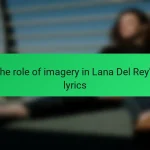Alternative rock song lyrics serve as the textual foundation of the alternative rock genre, characterized by themes of individuality, social issues, and emotional struggles. This genre, which emerged in the 1980s and gained prominence in the 1990s, is known for its innovative and introspective lyrics often featuring metaphorical language and abstract imagery. Influential bands such as Radiohead and Nirvana exemplify the genre’s lyrical depth while also incorporating experimental sounds that push creative boundaries through unconventional instrumentation and song structures. Common motifs in alternative rock lyrics include alienation, introspection, social commentary, existentialism, love, and rebellion, making the genre both relatable and impactful for listeners.

What are Alternative Rock Song Lyrics?
Alternative rock song lyrics are the textual components of songs within the alternative rock genre. These lyrics often explore themes of individuality, social issues, and emotional struggles. They frequently employ metaphorical language and abstract imagery. Many alternative rock bands, such as Radiohead and Nirvana, are known for their innovative and introspective lyrics. The genre emerged in the 1980s and gained widespread popularity in the 1990s. Alternative rock lyrics often challenge mainstream conventions and express a sense of rebellion. This lyrical style contributes to the genre’s unique identity and cultural impact.
How do Alternative Rock Song Lyrics differ from other genres?
Alternative rock song lyrics differ from other genres in their thematic depth and emotional complexity. They often explore existential themes, personal struggles, and societal issues. Unlike mainstream pop lyrics, alternative rock tends to prioritize authenticity over commercial appeal. The use of metaphor and abstract language is more prevalent in alternative rock. This genre frequently challenges conventional songwriting structures, allowing for varied forms of expression. Bands like Radiohead and Nirvana exemplify this lyrical innovation. Their songs often reflect disillusionment and introspection, setting them apart from more formulaic genres. Overall, alternative rock lyrics resonate with listeners seeking deeper meaning and connection.
What unique themes are commonly explored in Alternative Rock Song Lyrics?
Alternative rock song lyrics commonly explore themes of alienation, introspection, and social commentary. Alienation addresses feelings of isolation and disconnection from society. Introspection delves into personal struggles and self-discovery. Social commentary critiques societal norms and injustices. Other themes include existentialism, love, and mental health. These themes resonate with listeners, reflecting their own experiences. Bands like Radiohead and Nirvana exemplify these themes in their work. Their lyrics often challenge conventional perspectives, promoting deeper thought and emotional connection.
How do the lyrical structures in Alternative Rock contribute to its identity?
Lyrical structures in Alternative Rock significantly shape its identity through their complexity and emotional depth. Many songs employ unconventional narratives and abstract imagery. This divergence from traditional songwriting reflects the genre’s experimental nature. Artists often utilize varied rhyme schemes and non-linear storytelling. Such techniques allow for greater personal expression and thematic exploration. Bands like Radiohead and Nirvana exemplify this approach, pushing boundaries in lyrical content. Their lyrics often address existential themes, social issues, and personal struggles. This resonates strongly with listeners, fostering a sense of connection and authenticity. Overall, the lyrical structures contribute to Alternative Rock’s distinctiveness and cultural relevance.
Why is lyrical innovation important in Alternative Rock?
Lyrical innovation is important in Alternative Rock because it distinguishes the genre from mainstream music. Unique and thought-provoking lyrics allow artists to express complex emotions and social issues. This innovation fosters creativity and experimentation in songwriting. Bands like Radiohead and Nirvana have utilized innovative lyrics to challenge conventional themes. Their approach has influenced countless artists and shaped the genre’s evolution. The use of abstract imagery and personal narratives resonates with listeners on a deeper level. This connection enhances the overall impact of the music. Ultimately, lyrical innovation is a key component of Alternative Rock’s identity and cultural relevance.
What are some examples of groundbreaking lyrics in Alternative Rock history?
Groundbreaking lyrics in Alternative Rock history include “Smells Like Teen Spirit” by Nirvana. This song captures the angst of Generation X. Its raw and rebellious tone resonated with youth culture in the early 1990s. Another example is “Creep” by Radiohead. The lyrics express feelings of alienation and inadequacy. This theme struck a chord with listeners and showcased emotional vulnerability. “Losing My Religion” by R.E.M. features introspective lyrics that explore obsession and unrequited love. This track helped define the sound of the 1990s alternative scene. “Bitter Sweet Symphony” by The Verve addresses the struggles of life and materialism. Its philosophical lyrics and orchestral arrangement set it apart. Each of these songs showcases how lyrics in Alternative Rock can convey deep emotions and societal critiques.
How do lyrics reflect the cultural context of their time in Alternative Rock?
Lyrics in Alternative Rock reflect the cultural context of their time by addressing social issues and personal struggles. They often incorporate themes of disillusionment, rebellion, and identity. For example, songs from the 1990s, like Nirvana’s “Smells Like Teen Spirit,” captured the angst of a generation facing economic uncertainty and societal pressure. Additionally, bands like Radiohead explored themes of technology and alienation in the modern world, evident in tracks like “Paranoid Android.” The incorporation of these themes directly mirrors the cultural sentiments and challenges of their respective eras. This connection between lyrics and cultural context highlights the genre’s role as a voice for contemporary issues.

What role do experimental sounds play in Alternative Rock?
Experimental sounds play a crucial role in Alternative Rock by pushing creative boundaries. They enhance the genre’s diversity and innovation. Bands like Radiohead and Sonic Youth have integrated unconventional techniques. These techniques include unique instrumentation and unconventional song structures. Such experimentation often leads to new emotional expressions in music. The use of ambient noise and electronic elements adds depth to the sound. Historical context shows that the genre emerged from punk rock’s desire for artistic freedom. This freedom allowed artists to explore and redefine musical norms.
How do experimental sounds shape the overall feel of Alternative Rock songs?
Experimental sounds significantly shape the overall feel of Alternative Rock songs. They introduce unique textures and sonic landscapes that differentiate the genre. Such sounds can include unconventional instruments, electronic elements, and varied production techniques. This diversity enhances emotional expression and creates a distinct atmosphere. For instance, bands like Radiohead and Beck utilize experimental sounds to evoke feelings of tension and introspection. The incorporation of these elements often leads to innovative song structures and lyrical themes. As a result, Alternative Rock often challenges traditional music norms and engages listeners on multiple levels.
What instruments and techniques are commonly used to create experimental sounds?
Common instruments used to create experimental sounds include synthesizers, electric guitars, and drum machines. Synthesizers allow for a wide range of sound manipulation. Electric guitars can produce unconventional tones through effects pedals. Drum machines provide unique rhythmic patterns that differ from traditional drumming. Techniques like sampling and looping are also prevalent in experimental music. These methods allow artists to create layered textures and innovative soundscapes. Field recordings capture real-world sounds, adding an organic element to compositions. Together, these instruments and techniques push the boundaries of conventional music.
How do experimental sounds influence the lyrics and storytelling in Alternative Rock?
Experimental sounds significantly influence the lyrics and storytelling in Alternative Rock by creating unique auditory landscapes. These sounds often challenge traditional song structures, allowing for more abstract and innovative lyrical themes. Bands like Radiohead and Sonic Youth incorporate unconventional instrumentation, which enhances emotional depth and complexity in their lyrics. For example, Radiohead’s use of electronic elements in “Kid A” shifts the narrative focus toward themes of alienation and modernity. This experimentation leads to a more immersive storytelling experience, as the music itself becomes a part of the narrative. The blending of genres within Alternative Rock encourages artists to explore diverse lyrical content that reflects personal and societal issues. Overall, experimental sounds expand the creative possibilities for lyrics, resulting in richer and more varied storytelling.
Why are influential bands significant in the evolution of Alternative Rock lyrics?
Influential bands are significant in the evolution of Alternative Rock lyrics because they introduce new themes and perspectives. These bands often challenge societal norms and explore personal experiences. Their innovative approaches to songwriting redefine lyrical boundaries. For example, bands like Nirvana and Radiohead incorporated introspective and existential themes. This shift influenced countless artists in the genre. Moreover, their willingness to experiment with sound and structure changed how lyrics were perceived. The impact of these bands is evident in the diverse lyrical content present in contemporary Alternative Rock. Their legacy continues to inspire new generations of musicians.
Which bands are considered pioneers in Alternative Rock and what impact did they have?
R.E.M., Nirvana, and The Pixies are considered pioneers in Alternative Rock. R.E.M. popularized jangly guitar sounds and introspective lyrics, influencing countless bands in the 1980s and 1990s. Their album “Murmur” received critical acclaim and established them as a key player in the genre. Nirvana brought Alternative Rock to mainstream audiences with their landmark album “Nevermind.” The single “Smells Like Teen Spirit” became an anthem for a generation. The Pixies were known for their dynamic sound, blending quiet verses with loud choruses. Their influence can be seen in the music of bands like Radiohead and Weezer. Collectively, these bands shaped the sound and direction of Alternative Rock, paving the way for future artists.
How do the lyrics of influential bands continue to inspire new artists?
The lyrics of influential bands inspire new artists by providing a framework for emotional expression. These lyrics often address universal themes such as love, loss, and social issues. For example, bands like Nirvana and Radiohead tackled topics of alienation and mental health. Their unique lyrical styles encourage new artists to explore similar depths in their own work. Influential lyrics also introduce innovative storytelling techniques. This inspires emerging musicians to experiment with narrative structures in their songs. Additionally, iconic bands often set trends in lyrical content and style. New artists frequently draw from these trends to create fresh interpretations. This ongoing influence is evident in the music of contemporary bands who cite their predecessors as inspirations.

What are common themes and motifs found in Alternative Rock song lyrics?
Common themes in Alternative Rock song lyrics include alienation, introspection, and social commentary. Alienation reflects feelings of isolation and disconnection from society. Introspection often explores personal struggles and emotional depth. Social commentary addresses political and cultural issues. Other motifs include existentialism, love, and rebellion. Existentialism questions the meaning of life and one’s place in the world. Love can be portrayed in both positive and negative lights. Rebellion often challenges authority and societal norms. These themes resonate with listeners, making the genre relatable and impactful.
How do personal experiences shape the lyrics in Alternative Rock?
Personal experiences significantly shape the lyrics in Alternative Rock. Artists often draw from their own life events, emotions, and struggles. These personal narratives create authenticity in their music. Many Alternative Rock songs explore themes of heartbreak, mental health, and societal issues. For example, Kurt Cobain’s lyrics in Nirvana reflect his personal battles with depression and dissatisfaction. Similarly, bands like Radiohead often address feelings of alienation and existential angst. This connection to personal experience resonates with listeners. It fosters a sense of relatability and emotional depth in the genre. Ultimately, personal experiences serve as a vital source of inspiration for Alternative Rock lyrics.
What recurring motifs can be identified across various Alternative Rock songs?
Recurring motifs in Alternative Rock songs include themes of alienation, introspection, and rebellion. Alienation often reflects feelings of disconnection from society. Introspection involves self-examination and emotional vulnerability. Rebellion frequently critiques societal norms and expectations.
Songs like “Creep” by Radiohead exemplify alienation through lyrics that express feelings of inadequacy. The introspective nature is evident in tracks like “Nutshell” by Alice in Chains, which explores personal struggles. Rebellion is showcased in “Killing in the Name” by Rage Against the Machine, challenging authority and systemic oppression.
These motifs resonate across the genre, creating a shared emotional landscape that connects listeners. The prevalence of these themes highlights the genre’s focus on personal and societal issues.
How do Alternative Rock lyrics address social and political issues?
Alternative Rock lyrics often tackle social and political issues by expressing dissent and raising awareness. Bands like Rage Against the Machine and Pearl Jam use their music to critique government policies and social injustices. Their lyrics frequently address themes such as inequality, war, and environmental concerns. For example, Rage Against the Machine’s song “Killing in the Name” critiques systemic racism and police brutality. Similarly, Pearl Jam’s “Jeremy” highlights the struggles of youth and the consequences of bullying. This genre’s emphasis on authenticity allows artists to convey personal experiences that reflect broader societal issues. The use of metaphor and vivid imagery in their lyrics enhances the emotional impact, making listeners more aware of these critical topics.
What techniques do artists use to enhance lyrical impact in Alternative Rock?
Artists in Alternative Rock enhance lyrical impact through various techniques. They often employ vivid imagery to evoke strong emotions. Metaphors and similes create deeper connections with listeners. Additionally, unconventional song structures keep the audience engaged. Artists frequently use personal narratives to convey authenticity. The incorporation of social commentary adds relevance to the lyrics. Poetic devices, such as alliteration and assonance, enhance the musicality of the words. Collaborations with diverse genres contribute to unique lyrical perspectives. These techniques collectively strengthen the overall message and emotional resonance of the songs.
How does metaphor and imagery play a role in Alternative Rock lyrics?
Metaphor and imagery are essential elements in Alternative Rock lyrics. They enhance emotional expression and create vivid mental pictures. Artists often use metaphors to convey complex feelings and ideas. For example, comparing love to a storm can illustrate intensity and chaos. Imagery paints scenes that resonate with listeners, making the music relatable. Bands like Radiohead and Nirvana frequently employ these techniques to deepen their lyrical impact. Research shows that metaphorical language can evoke stronger emotional responses in audiences. This connection reinforces the genre’s appeal and artistic depth.
What are the effects of rhythm and rhyme on the delivery of Alternative Rock lyrics?
Rhythm and rhyme significantly enhance the delivery of Alternative Rock lyrics. They create a musicality that engages listeners. Rhythm establishes a flow that complements the emotional tone of the song. Rhyme adds a layer of memorability, making lyrics easier to remember. This combination can intensify the impact of the message conveyed. For instance, bands like Radiohead and Nirvana utilize these elements to evoke specific feelings. Their rhythmic patterns and rhyming schemes contribute to the overall aesthetic of their music. Studies show that rhythmic and rhyming lyrics can increase listener retention and emotional response.
What are some best practices for writing impactful Alternative Rock lyrics?
To write impactful Alternative Rock lyrics, focus on authenticity and emotional resonance. Use personal experiences to create relatable themes. Incorporate vivid imagery to evoke strong emotions. Experiment with unconventional song structures to enhance originality. Utilize metaphor and symbolism to add depth to your lyrics. Engage listeners with thought-provoking questions or statements. Maintain a conversational tone to connect with the audience. Lastly, revise and edit rigorously to ensure clarity and impact.
Alternative rock song lyrics represent the textual elements within the alternative rock genre, characterized by themes of individuality, social issues, and emotional struggles. This article explores how these lyrics differ from other genres through their depth and complexity, often employing metaphorical language and abstract imagery. It examines the influence of pioneering bands like Nirvana and Radiohead on lyrical innovation, as well as the significance of experimental sounds in shaping the genre’s identity. Additionally, the article discusses recurring motifs, techniques for enhancing lyrical impact, and the cultural context reflected in alternative rock lyrics.


